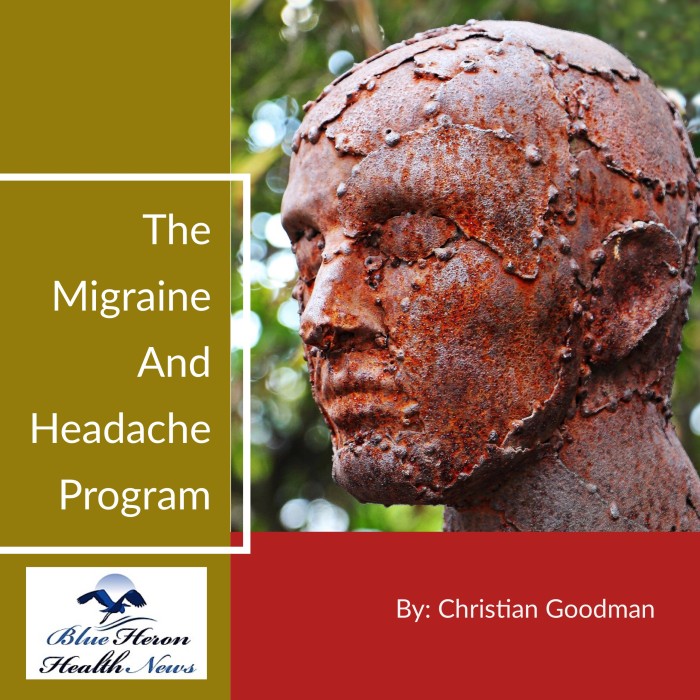
The Migraine And Headache Program By Christian Goodman This program has been designed to relieve the pain in your head due to any reason including migraines efficiently and effectively. The problem of migraine and headaches is really horrible as it compels you to sit in a quiet and dark room to get quick relief. In this program more options to relieve this pain have been discussed to help people like you.
What is the impact of chronic migraines on mental health?
Chronic migraines can have a profound impact on mental health, affecting various aspects of emotional, psychological, and social well-being. Individuals who suffer from chronic migraines often face significant challenges that extend beyond the physical pain, leading to a range of mental health issues. Here’s a detailed look at how chronic migraines can impact mental health:
1. Increased Risk of Depression
- Higher Prevalence: Studies have shown that individuals with chronic migraines are at a significantly higher risk of developing depression compared to those without migraines. The constant pain, disability, and lifestyle limitations associated with chronic migraines can contribute to feelings of hopelessness and despair.
- Chronic Pain and Mood: Chronic pain from migraines can lead to changes in brain chemistry, particularly in areas that regulate mood and emotion. This can exacerbate depressive symptoms and create a cycle where depression and migraines feed into each other, worsening both conditions.
2. Anxiety Disorders
- Generalized Anxiety Disorder (GAD): Chronic migraines are often associated with increased anxiety, particularly generalized anxiety disorder. The unpredictability of migraine attacks can cause constant worry and fear about when the next attack will occur, leading to heightened anxiety levels.
- Panic Attacks: Some individuals with chronic migraines may experience panic attacks, especially if they associate certain environments or activities with triggering migraines. The fear of having a migraine in a public or stressful situation can lead to avoidance behaviors and social withdrawal.
3. Stress and Stress-Related Disorders
- Chronic Stress: Living with chronic migraines can be highly stressful. The need to manage frequent pain, cope with disability, and maintain daily responsibilities despite migraines can lead to chronic stress, which in turn can exacerbate migraine frequency and severity.
- Post-Traumatic Stress Disorder (PTSD): While less common, some individuals with severe chronic migraines may develop PTSD, particularly if they have experienced traumatic or life-altering events related to their condition, such as a severe migraine attack that required emergency care.
4. Social Isolation and Loneliness
- Reduced Social Interaction: Chronic migraines can lead to social isolation, as individuals may withdraw from social activities to avoid potential triggers or due to the fear of having an attack in public. This isolation can result in feelings of loneliness and contribute to mental health issues like depression and anxiety.
- Impact on Relationships: Chronic migraines can strain personal relationships, including those with family, friends, and colleagues. The inability to participate in social events, maintain regular communication, or fulfill work responsibilities can lead to misunderstandings, frustration, and a sense of alienation.
5. Cognitive Impairments
- Brain Fog: Chronic migraines can cause cognitive impairments, often referred to as “brain fog.” This includes difficulties with concentration, memory, and decision-making. These cognitive challenges can affect work, academic performance, and daily functioning, contributing to feelings of inadequacy and frustration.
- Impaired Productivity: The cognitive impairments associated with chronic migraines can lead to reduced productivity at work or school, further impacting mental health by increasing stress and feelings of failure or guilt.
6. Sleep Disturbances
- Insomnia and Poor Sleep Quality: Chronic migraines are often associated with sleep disturbances, including insomnia and poor sleep quality. The pain and discomfort of migraines can make it difficult to fall asleep or stay asleep, leading to chronic fatigue and exacerbating mental health issues.
- Impact on Mood: Poor sleep quality can significantly affect mood, leading to irritability, increased anxiety, and a higher risk of depression. The relationship between sleep disturbances and migraines is bidirectional, with each condition potentially worsening the other.
7. Emotional Distress and Coping Challenges
- Feelings of Hopelessness: The persistent nature of chronic migraines can lead to feelings of hopelessness and helplessness, particularly if treatment options have been ineffective. This emotional distress can contribute to the development of depressive symptoms.
- Coping with Chronic Illness: Managing a chronic condition like migraines requires significant emotional and psychological resilience. The ongoing need to cope with pain, disability, and the uncertainty of migraine attacks can lead to emotional exhaustion and burnout.
8. Impact on Quality of Life
- Reduced Quality of Life: Chronic migraines can have a profound impact on an individual’s overall quality of life. The constant pain, frequent doctor visits, and the need to manage medication and triggers can consume a significant portion of one’s life, leading to a diminished sense of well-being.
- Loss of Independence: For some individuals, chronic migraines can lead to a loss of independence, particularly if they are unable to work, drive, or participate in daily activities. This loss can contribute to feelings of low self-worth and depression.
9. Suicidal Thoughts and Behaviors
- Increased Suicide Risk: Individuals with chronic migraines are at a higher risk of suicidal thoughts and behaviors, particularly if they also suffer from depression or anxiety. The relentless nature of chronic pain and the impact on daily life can lead to feelings of hopelessness and a desire to escape the pain.
- Need for Immediate Support: It’s crucial for individuals experiencing suicidal thoughts to seek immediate help from a healthcare provider, mental health professional, or a crisis hotline. Early intervention can save lives.
10. Psychological and Behavioral Interventions
- Cognitive-Behavioral Therapy (CBT): CBT is a widely used therapy for managing chronic pain and associated mental health issues. It helps individuals develop coping strategies, reframe negative thought patterns, and manage stress, which can reduce the impact of migraines on mental health.
- Mindfulness and Relaxation Techniques: Mindfulness meditation, progressive muscle relaxation, and other relaxation techniques can help manage stress and anxiety, potentially reducing the frequency and severity of migraines and improving overall mental well-being.
- Support Groups and Counseling: Joining a support group or engaging in counseling can provide emotional support and practical advice for managing the mental health challenges associated with chronic migraines. These resources can help individuals feel less isolated and more empowered in their journey.
Conclusion
Chronic migraines can have a significant and multifaceted impact on mental health, leading to conditions such as depression, anxiety, stress, and social isolation. The persistent nature of the pain and the limitations it imposes on daily life can contribute to a cycle of emotional distress and worsening migraine symptoms. However, with appropriate psychological support, medical treatment, and lifestyle adjustments, individuals with chronic migraines can manage both their physical and mental health, improving their quality of life. If you or someone you know is struggling with the mental health impact of chronic migraines, it’s important to seek help from healthcare providers and mental health professionals.

The Migraine And Headache Program By Christian Goodman This program has been designed to relieve the pain in your head due to any reason including migraines efficiently and effectively. The problem of migraine and headaches is really horrible as it compels you to sit in a quiet and dark room to get quick relief. In this program more options to relieve this pain have been discussed to help people like you.